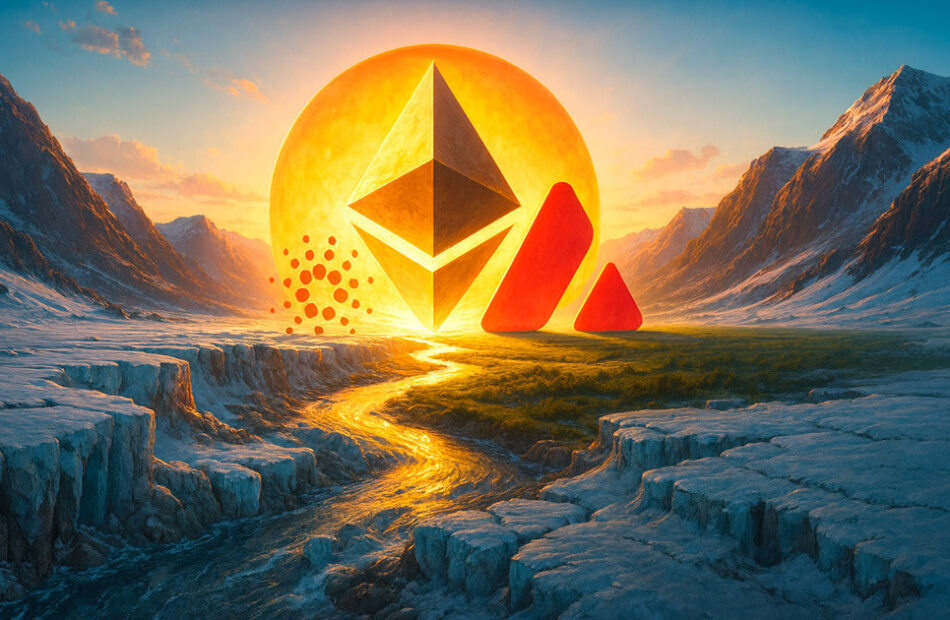Top Layer-1 Blockchains to Watch in a Pro-Crypto Shift
The crypto market has gone through a lot of ups and downs since 2022. First, the Terra (LUNA) crash shook the industry, and then the FTX collapse truly burst the crypto bubble. After that, attention shifted from blockchain to artificial intelligence (AI), and the crypto space faced constant regulatory pressure and banking restrictions under the Biden administration.
But now, there’s a renewed sense of hope as the pro-crypto Trump administration brings more favorable conditions for digital assets and decentralized finance (DeFi). This optimism is reflected in the rising total value locked (TVL) in DeFi platforms, which has bounced back to $156 billion — levels not seen since early 2022.
Ethereum is leading this DeFi revival. In the past month alone, Ethereum (ETH) jumped 53%, while Bitcoin (BTC) stayed flat. This signals the start of an “altcoin season,” where smaller cryptocurrencies outperform Bitcoin. For long-term investors looking at Layer-1 blockchains, Ethereum remains a top choice.
Why Ethereum Still Stands Out:
– **Strong Developer Ecosystem:** Ethereum has the largest number of developers and the most active ecosystem. It supports Layer-2 networks like Polygon, Arbitrum, Optimism, and Base, which help scale the network and reduce fees.
– **Deflationary Potential:** Since Ethereum’s EIP-1559 upgrade, it burns a portion of transaction fees. Combined with staking, this keeps its inflation rate around 0.75%—similar to Bitcoin after its latest halving.
– **Future-Proofing:** The recent Pectra upgrade improved Layer-2 efficiency using Blob Space, doubling ETH’s burn rate. Features like account abstraction and sharding are also being developed to make Ethereum more scalable and user-friendly.
– **Stablecoin Leader:** Ethereum dominates the stablecoin market, holding around $138.6 billion—more than half of the global stablecoin supply. Stablecoins are key for onboarding new users into DeFi by offering a familiar dollar-backed experience.
– **Institutional Interest:** Major entities are accumulating ETH. Treasuries now hold around 3.57 million ETH worth over $16.5 billion, mirroring how Bitcoin ETFs boosted BTC prices.
However, it’s not all about buying and holding. History shows that when Ethereum’s Market Value to Realized Value (MVRV) ratio crosses 3.0, it may be time for a price correction. This is something to watch for after a potential interest rate cut by the Federal Reserve in September. Still, analysts like FundStrat believe ETH could reach $10,000 by year-end.
Other Layer-1 Blockchains to Watch:
**Avalanche (AVAX):**
Launched in 2020, Avalanche uses a unique multi-chain setup:
– X-Chain handles asset transfers
– C-Chain runs smart contracts compatible with Ethereum
– P-Chain manages staking and validators
This design makes Avalanche flexible for organizations that want custom rules or privacy. FIFA even chose Avalanche for its NFT platform, and the Avalanche Foundation recently launched a $50 million fund to support blockchain gaming.
Token-wise, 90% of AVAX’s supply is already unlocked. While its inflation rate is higher at 3.8%, AVAX is still capped at 720 million tokens total. With new projects like Euler Finance, Nexpace (MapleStory N), VanEck’s VBILL fund, and more launching on Avalanche, daily active addresses have grown by 210% this quarter. AVAX is currently priced around $25 but has hit $50+ multiple times in 2024.
**Cardano (ADA):**
Cardano often flies under the radar but has been quietly building its ecosystem. Started by Ethereum co-founder Charles Hoskinson, Cardano is known for its academic approach and slow but steady development.
In early 2024, Cardano got its own USD-backed stablecoin called USDM, fully compliant with European MiCA regulations. Norwegian Block Exchange (NBX) also adopted it.
For scaling, Cardano is working on Layer-2 solutions like Hydra for faster transactions and Mithril for easier node syncing. By year-end, new upgrades like Ouroboros Peras and Ouroboros Leios are expected to greatly improve transaction speeds—possibly matching Solana’s performance.
Cardano is also preparing zero-knowledge smart contracts by late 2025, which will add privacy and scalability. Its Midnight project focuses on private transactions.
Financially, Cardano’s tokenomics are strong. ADA’s inflation rate is just 0.7% per year with a hard cap of 45 billion tokens. This mirrors Ethereum’s sound-money model.
So far in 2024, ADA is up only 2.5% and still trades under $1 per token—far from its all-time high of $3.10 in 2021. For long-term investors looking for undervalued assets with strong potential, Cardano offers an interesting opportunity.
In Summary:
– Ethereum remains the leader in DeFi with solid fundamentals and growing institutional interest.
– Avalanche is gaining momentum with its unique tech structure and enterprise use cases.
– Cardano offers a quiet but promising future with strong tokenomics and upcoming upgrades.
As we move further into a more crypto-friendly political environment, these Layer-1 blockchains could play a major role in shaping the next wave of DeFi adoption.

